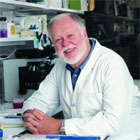Curtis C. Harris, MD, National Cancer Institute/NIH

The Harris lab is investigating connections between inflammation, microRNAs, metabolome, microbiome and cancer using a precision medicine strategy. Molecular mechanisms of microRNAs and cytokines associated with human cancer diagnosis, prognosis, and therapeutic outcomes are being investigated. Gene-environment interaction is a seminal concept in the molecular epidemiology of human cancer; their ongoing studies include lung, colon and esophageal cancer. Cellular senescence is a tumor suppressive mechanism that can be activated by p53. They are focused on both the integrative p53 and microRNA networks in tumor suppression and the functional role of p53 isoforms, as natural regulators of cellular senescence and stem cell biology and their dysregulation in cancer and aging.
Products
References
- Klein-Szanto AJ, Iizasa T, Momiki S, Garcia-Palazzo I, Caamano J, Metcalf R, Welsh J, Harris CC. A tobacco-specific N-nitrosamine or cigarette smoke condensate causes neoplastic transformation of xenotransplanted human bronchial epithelial cells. Proc Natl Acad Sci U S A. 1992 Aug 1;89(15):6693-7.



